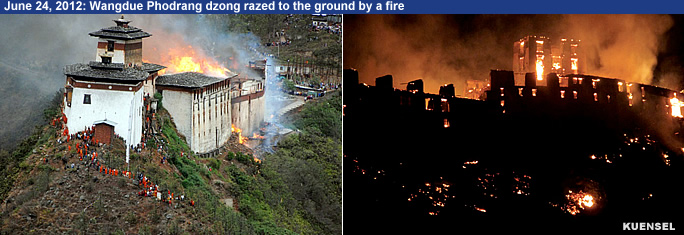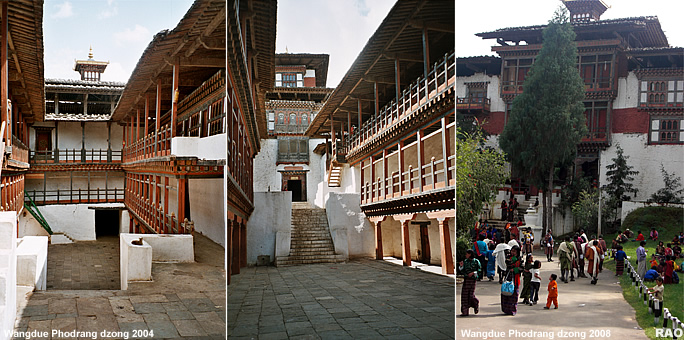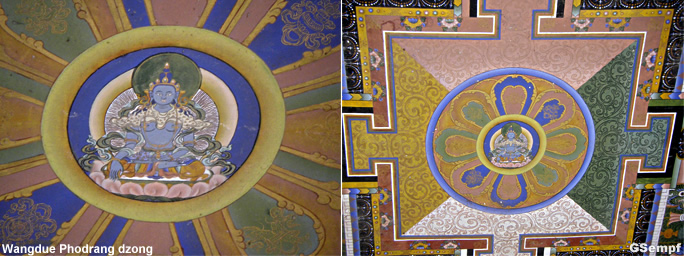| You are here: | Home > Bhutan > Culture > Religion > Dzongs > Wangduephodrang Dzong > Fire | Search |
 |
| Bhutan's Culture |
| Wangduephodrang Dzong |
|
 |
| Wangduephodrang Dzong |
June 24, 2012
Historic edifice reduced to ashes - Wangduephodrang dzong was razed to the ground in a fire
Nation watches in sadness and disbelief a national treasure razed to the ground. Fire crews were working to extinguish a major fire that was engulfing Wangduephodrang dzong. The fire reportedly broke out at around 4-5 pm, around the entrance to the dzong.

|
«The fire that started around 4pm raged on into the night. Except for the safe boxes containing the sacred relics (ngangtens) that were dropped from the roof into the nearby cacti undergrowth, nothing could be saved from yesterday's fire that burnt away 374 years of history in five hours.
Hundreds of people, who rushed to the Wangduephodrang dzong around 4pm, watched in dismay and tears, as the fortress, built by Zhabdrung Ngawang Namgyal in 1638 on the ridge at the confluence of the Phochu-Mochu and Dangchu rivers, went up in flames.
Although it drizzled, the fire continued to conflagrate, sending up thick black smoke and sparks, and filling the air with the smell of charred wood.All that could be heard was the roar of generators and fire brigade trucks that continued to douse the fire.It was as if the sleeping elephant that carried the fortress was standing up and shaking off the dzong it carried for centuries.
Wangduephodrang dzongda Lhendup Wangchhu was among the few, who managed to get inside the dzong, soon after the Bhutan Power corporation's manager informed him about the fire.
"When I reached there, there were already people battling the fire that had started from the ground floor of the administration block," the dzongda said.
The dzongda injured his toe, when the heavy relic trunk they were trying to pick up and drop off the roof, hit his foot."The doors were locked, and when we managed to break it open, the fire that was burning inside just got blown out towards us; a police personnel was hurt, I think," he said. "After that, there was no stopping the fire. Strong winds from the south was fanning it and, even with people, there was nothing we could do."

|
Wangduephodrang Dzong Fire - Mithrub lhakhang comes through almost unscathed
While there was not enough on Sunday, water in muddy pools lay around the charred mud and stone walls of the four centuries old fortress that runs about 250 metres long on the ridge that resembles a sleeping elephant.
But the fire could not burn down one lhakhang of the 14 inside the dzong.
Rescue teams, rummaging through the debris with thick gloves around 11am yesterday, salvaged from the Mithrub lhakhang, the newly installed lam's chair (throne/thri), a carved choedrum, scriptures, three water offering bowls (ting), two kilograms of Dalda, and a steel trunk, that was still hot to be opened.
Even the wall painting of the lhakhang, which is located between the utse and the dukhang (meeting hall for monks) of the dzong, wasn't burnt, home minister Minjur Dorji said.
The lhakhang can seat about 50 monks at a time and is located on the left side from the entrance, towards Dangchu River.
The 14 lhakhangs contained:
| 239 Mud statues
219 Statues made of superior metals like gold and copper 167 Thanka 35 Stupas made of silver and superior quality of wood (zangshing) 7 Phurpa (thunderbolt) |
4 Gold scriptures
4 Kanjur, Tenjur and Kabum 24 Elephant tusks 1 Rhino horn 1 Earthen horn |

|
"Despite the heat, they told us that the Dalda, which was inside another steel trunk, hadn't melted," the mishe lam (one who conducts funeral rites), Dawa Dakpa said. "Even the altar hadn't burnt."
Senior monks said the lhakhang's flooring was not wood but earthen, made from a soil called apsakusa, which is water and fire resistant. "That's why the relics inside were safe," one of the senior monks said. "Before, the whole dzong's flooring was made of this soil, but later it was replaced with wood, except for the Mithrub lhakhang."
According to records with the dzongkhag's monastic body, the dzong's 14 lhakhangs contained 915 kinds of relics.The inventory is still ongoing, and about 98 items have been listed as saved from the fire so far, culture officials said.
Lyonpo Minjur Dorji said that, until the dzong is rebuilt, the courtyard of the drasha (hostel) would be turned into a place for the monk body to conduct their annual religious functions.
The home minister and the dzongkhag administration also decided yesterday to temporarily move the dzongkhag administration to Bajothang high school from July 1, when the school closes for summer vacation.
After 15 days, when the school reopens, the dzongkhag administration that has about 22 offices and 80 staff will move to the Choekhang, above Bajo town.
The Choekhang, an open hall for religious discourse, which can seat about 5,000 people, is still under construction.In two weeks time, it has to be readied with partitions and roofed for the dzongkhag administration to function out from, lyonpo Minjur said.
Lyonpo Minjur Dorji said the government of India was funding the dzong's ongoing conservation project. "We anticipate support from the government of India to help us rebuild the dzong," he said.
About 70 percent of the work at the southern part of the dzong, which earlier housed the monastic body, had been completed, project officials said. Disaster risk management for the dzong like fire safety was planned at a later phase.
Conservation work inside the dzong started eight months ago.The scaffoldings they were using in their conservation works came in handy to rescue the relics on Sunday. "If the fire had happened on a working day, we could have contained it," an official said. "There are more than 300 people working inside the dzong."
Doctors have meanwhile advised Wangduephodrang dzongda Lhendup Wangchhu, who has been running around coordinating rescue and salvage operations since the fire incident, to take bed rest because of the infection his toe injury has caused. "There is a fracture of the toe bone and he is put on antibiotics," Bajo hospital's Dr Phuntsho Dorji said. "He shouldn't be walking, the infection might spread."
| This article was contributed by Sonam Pelden, KUENSEL, Bhutan's National Newspaper 2012 |

|
| Information on Bhutan |
|
||||||||||||||||||
|

|